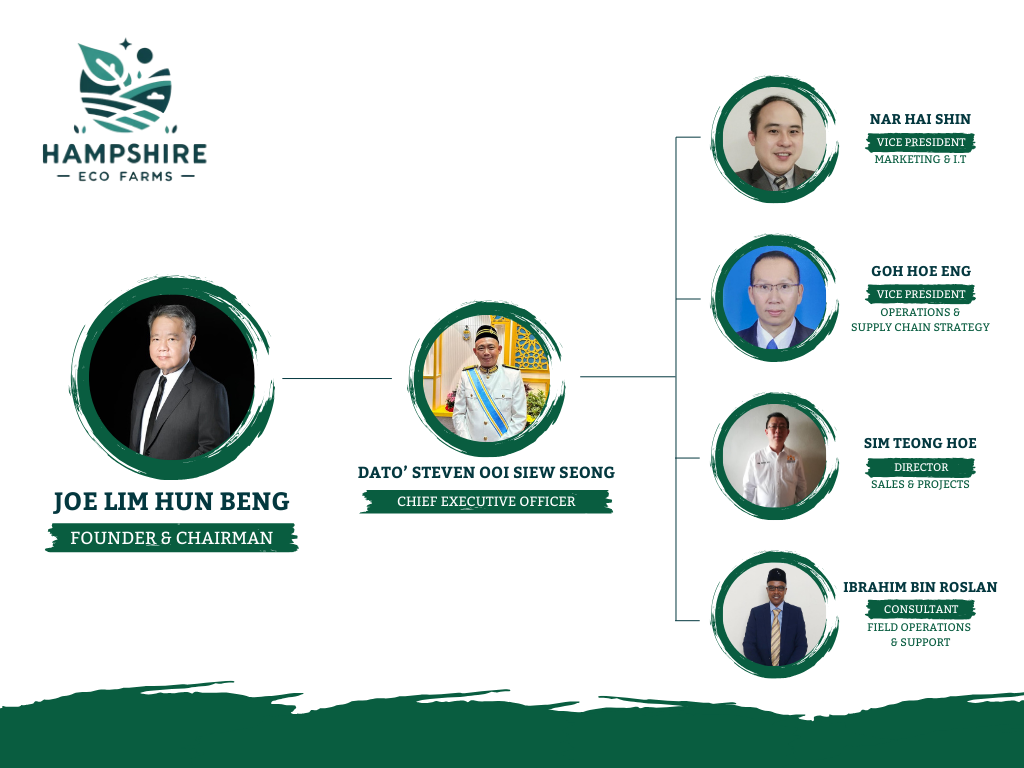Corporate Profile
Hampshire Eco Farms Sdn Bhd rebranded in 2013, pioneers eco-sustainable agriculture by integrating organic farming with renewable energy.

History and Background
Hampshire Eco Farms Sdn Bhd, initially established as Mega Opal Sdn Bhd on July 17, 2008, rebranded and shifted focus towards eco-sustainable practices on October 21, 2013. This transition reflects our dedication to innovative agricultural practices that respect and enrich the environment. Over the years, HAMPSHIRE ECOFARMS has expanded from a modest operation into a pioneer of eco-agriculture, integrating organic farming with renewable energy solutions to model sustainability in agriculture.
Mission
-
"We embrace the coexistence of nature and human activities." Hampshire Eco Farms is dedicated to integrating sustainable agricultural practices with daily living, ensuring that every aspect of its operations contributes positively to the natural environment. The mission underscores a commitment to practices that respect and enhance biodiversity, support ecological balance, and promote long-term sustainability.
Vision
-
"For everyone who wants to live an active lifestyle and contribute to carbon reduction." The vision sets a clear directive for the future, aiming to inspire and implement lifestyle choices that are not only healthy and active but also environmentally responsible. Through its operations, Hampshire Eco Farms seeks to be at the forefront of reducing carbon footprints via innovative farming techniques, renewable energy usage, and carbon sequestration methods such as biochar application.
Farming Systems
Neutrality
Growth
Implement a holistic farming system that combines crop production, livestock rearing, agroforestry and aquaculture, maximizing resource efficiency and promoting a sustainable agricultural ecosystem.
Attain net-zero carbon emissions by 2030 using innovative carbon farming practices and renewable energy solutions, integrating biochar production, solar, and biogas systems to reduce our carbon footprint.
Target 3,000 acres of Ecofarms by 2030, with a focus on sustainable and regenerative practices, such as organic farming, soil conservation, and biodiversity enhancement.
Core Values
Sustainability
Commitment to practices that do not deplete resources or harmecological systems.
Innovation
Continuously improve and innovate to stay at the forefront of eco-agriculture technology.
Integrity
Operate transparently with all stakeholders, ensuring ethical standards are met in every aspect of our operations.
Technological and Environmental Innovation
HAMPSHIRE ECOFARMS has integrated various innovative practices to enhance sustainability
Renewable Energy Utilization:
-
Harnessing various renewable Natural-energy and Bio-energy sources, to power our operations and significantly reduce our reliance on fossil fuels.
Sustainable Farming Technologies:
-
Transform Bamboo, Napier Glass residues, and other agricultural waste into biochar and bio-fertilizer. This process enriches the soil, sequesters carbon, and turns waste into a valuable resource for sustainable farming.
Agricultural Innovation and Research:
-
Stay at the forefront of agricultural innovation by adopting the latest technologies, investing in precision farming, automated irrigation, and sustainable crop management systems, and collaborating with universities and research institutions.
Market Analysis and Competitive Strategy
The global organic food market is projected to grow at a CAGR of 14% from 2021 to 2027, indicating a robust market demand. HAMPSHIRE ECOFARMS is positioned to capitalize on this trend by expanding our range of organic products and enhancing our market presence both locally and internationally through strategic marketing and high-quality product offerings.

Financial Strategy:
-
- Revenue Streams: Diversified income from organic crops, eco-tourism, and sale of biochar and renewable energy credits.
-
- Profitability: Projected to achieve profitability by Year 3 with increased production efficiency and market expansion.

Impact:
-
- Environmental: Significantly reduce carbon emissions and enhance local biodiversity.
-
- Social: Improve community health and economic stability by providing local employment and education opportunities.
-
- Economic: Contribute to the local and national economy through sustainable business practices.
Our Team










